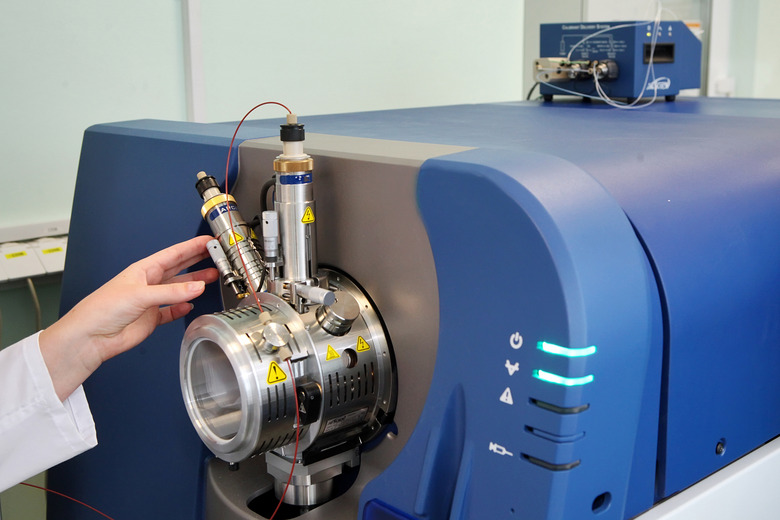What Does A Mass Spectrometer Do?
When you are working in a lab, the mass spectrometer may become your best friend. Another name for the instrument is the mass spec, and it can measure the mass of molecules. Whether you need to find out what is inside a large protein or find impurities in a sample, this spectrometer can handle it. The results are accurate and useful for understanding a variety of substances.
TL;DR (Too Long; Didn't Read)
A mass spectrometer is a type of instrument that can measure the concentration and mass of molecules. It uses magnetic forces on ionized atoms.
What a Mass Spectrometer Does
What a Mass Spectrometer Does
A mass spectrometer can weigh ions in the gas phase and can show you the mass and concentration of molecules in a sample. The mass spec also provides an accurate way of seeing which atoms are in a mixture. You can also use it to analyze large molecules such as proteins.
How Do You Use a Mass Spectrometer?
How Do You Use a Mass Spectrometer?
Several steps exist in the process of using a mass spectrometer, starting with ionization. First, the instrument vaporizes the molecules in a sample. The molecules are now in the gas phase. Next, the molecules turn into ions when an electron beam bombards them. The mass spec can only measure ions or charged particles.
After ionization, acceleration and deflection occur. The machine accelerates ions toward negative plates, which sorts the ions by their mass, so the heavier ones move more slowly. Then, a magnetic field deflects the ions, and this also helps separate them by weight.
The final part of the process is detection. The detector measures the ions and shows the results on a chart or mass spectrum. It does this by recording the charge induced from the ion when it either hits or passes by its surface.
What Information Does a Mass Spectrometer Give You?
What Information Does a Mass Spectrometer Give You?
The results give you a mass spectrum diagram, which looks like a graph with relative abundance or intensity on the y side and m/z on the x side. In m/z, the m stands for mass, and the z means charge. You can look at the tallest line on the chart to see the largest ion. This is the molecular ion and the heaviest one.
Why Is a Mass Spectrometer Important?
Why Is a Mass Spectrometer Important?
A mass spectrometer is important for carbon dating, and it can help find toxins or impurities in substances. In addition, it can help researchers discover small particles, analyze mixtures and understand proteins. Some of the industries that benefit from mass spec include neonatal screening, drug discovery, pharmacokinetics and biotechnology.
Cite This Article
MLA
Bandoim, Lana. "What Does A Mass Spectrometer Do?" sciencing.com, https://www.sciencing.com/what-does-a-mass-spectrometer-do-13710456/. 27 March 2018.
APA
Bandoim, Lana. (2018, March 27). What Does A Mass Spectrometer Do?. sciencing.com. Retrieved from https://www.sciencing.com/what-does-a-mass-spectrometer-do-13710456/
Chicago
Bandoim, Lana. What Does A Mass Spectrometer Do? last modified March 24, 2022. https://www.sciencing.com/what-does-a-mass-spectrometer-do-13710456/
